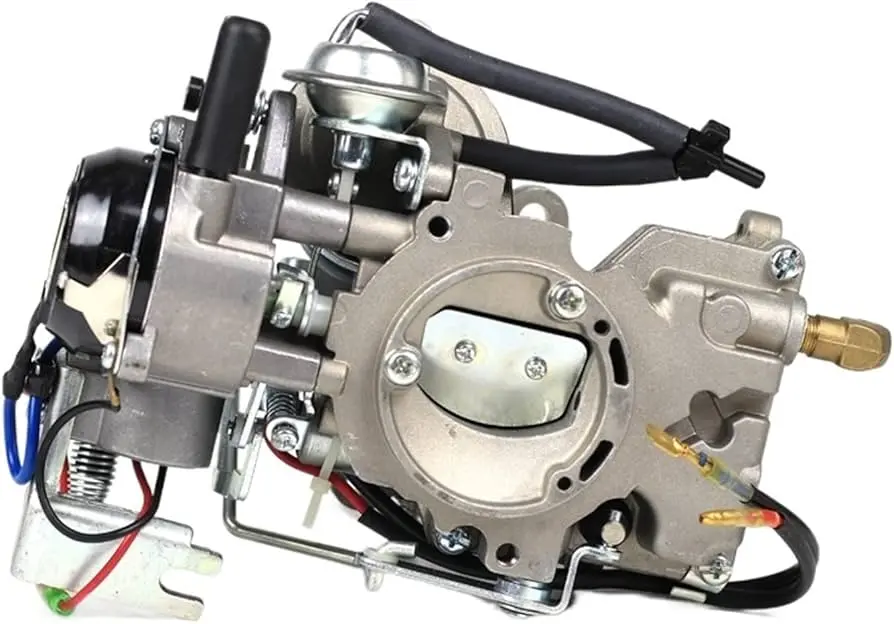Forklift Nissan K24 Propane Carburetor Fuel
Forklifts are essential machines in various industries, from warehouses to construction sites. Among the many types available, propane-powered forklifts have gained popularity due to their efficiency and lower emissions. In this article, we’ll delve into the specifics of the forklift nissan k24 propane carburetor fuel system, exploring its components, benefits, and maintenance requirements.
The Nissan K24 Engine: A Brief Overview
Before we dive into the propane carburetor fuel system, let’s take a moment to understand the Nissan K24 engine:
- Developed by Nissan Motor Company
- Four-cylinder, inline configuration
- Displacement: 2.4 liters
- Known for reliability and versatility
- Widely used in forklifts and other industrial equipment
The K24 engine’s adaptability makes it an excellent choice for propane fuel systems, which brings us to our main topic: the forklift nissan k24 propane carburetor fuel system.
Understanding Propane as a Forklift Fuel
Propane, also known as liquefied petroleum gas (LPG), has become a popular choice for powering forklifts. Here’s why:
- Clean-burning properties
- Lower emissions compared to gasoline or diesel
- Cost-effective in many regions
- Longer shelf life than traditional fuels
When used in a forklift nissan k24 propane carburetor fuel system, propane offers several advantages that we’ll explore in more detail later in this article.
Components of the Forklift Nissan K24 Propane Carburetor Fuel System
To fully grasp how the forklift nissan k24 propane carburetor fuel system works, it’s essential to understand its key components:
1. Propane Tank
- Stores liquefied propane under pressure
- Typically holds 33 pounds (15 kg) of propane
- Equipped with safety valves and gauges
2. Fuel Lock-off
- Controls the flow of propane to the carburetor
- Activated by the ignition switch
- Prevents fuel flow when the engine is off
3. Vaporizer/Converter
- Converts liquid propane to gaseous form
- Regulates pressure for optimal fuel delivery
- Often includes a filter to remove impurities
4. Carburetor
- Mixes propane gas with air
- Ensures proper fuel-to-air ratio for combustion
- Specifically designed for use with propane
5. Mixer
- Combines air and propane before entering the engine
- Helps maintain optimal fuel mixture
6. Air Cleaner
- Filters incoming air to remove dust and debris
- Protects the engine from contaminants
7. Fuel Lines and Fittings
- Safely transport propane from tank to engine
- Must be regularly inspected for leaks or damage
Understanding these components is crucial for proper maintenance and troubleshooting of the forklift nissan k24 propane carburetor fuel system.
How the Forklift Nissan K24 Propane Carburetor Fuel System Works
Now that we’ve identified the key components, let’s explore how they work together in the forklift nissan k24 propane carburetor fuel system:
- When the ignition is turned on, the fuel lock-off opens, allowing propane to flow from the tank.
- Liquid propane passes through the vaporizer/converter, where it’s transformed into a gaseous state.
- The gaseous propane enters the carburetor, which mixes it with air in the correct ratio.
- The air-fuel mixture is then drawn into the engine’s cylinders.
- The spark plugs ignite the mixture, powering the engine.
This process ensures efficient fuel delivery and combustion, maximizing the performance of the Nissan K24 engine.
Benefits of the Forklift Nissan K24 Propane Carburetor Fuel System
The forklift nissan k24 propane carburetor fuel system offers several advantages over traditional gasoline or diesel systems:
- Lower Emissions: Propane burns cleaner than gasoline or diesel, reducing harmful emissions and improving air quality in enclosed spaces.
- Cost-Effective: In many regions, propane is less expensive than gasoline or diesel, leading to lower operating costs.
- Extended Engine Life: The clean-burning nature of propane can lead to less engine wear and longer overall lifespan.
- Improved Cold-Start Performance: Propane vaporizes easily, even in cold temperatures, ensuring reliable starts in various conditions.
- Reduced Fuel Theft: Propane is less likely to be stolen than gasoline or diesel due to its specialized storage and handling requirements.
- Increased Productivity: Propane-powered forklifts can be quickly refueled by swapping out empty tanks, minimizing downtime.
- Versatility: The forklift nissan k24 propane carburetor fuel system can be used both indoors and outdoors, making it suitable for various applications.
Maintenance Requirements for the Forklift Nissan K24 Propane Carburetor Fuel System
To ensure optimal performance and longevity of your forklift nissan k24 propane carburetor fuel system, regular maintenance is essential. Here are some key maintenance tasks:
Daily Checks
- Inspect fuel lines and connections for leaks
- Check propane tank for damage or excessive wear
- Ensure proper fuel level in the tank
Weekly Maintenance
- Clean or replace air filter as needed
- Inspect carburetor for signs of wear or damage
- Check and adjust idle speed if necessary
Monthly Tasks
- Inspect and clean the vaporizer/converter
- Check and tighten all fuel system connections
- Lubricate moving parts as recommended by the manufacturer
Quarterly Maintenance
- Perform a thorough inspection of all fuel system components
- Replace fuel filter
- Check and adjust fuel mixture if needed
Annual Service
- Complete system overhaul by a qualified technician
- Replace worn components as necessary
- Conduct pressure and leak tests on the entire system
By following these maintenance guidelines, you can ensure the safe and efficient operation of your forklift nissan k24 propane carburetor fuel system.
Troubleshooting Common Issues with Forklift Nissan K24 Propane Carburetor Fuel Systems
Even with proper maintenance, issues may arise with your forklift nissan k24 propane carburetor fuel system. Here are some common problems and their potential solutions:
- Engine Won’t Start
- Check propane tank level
- Ensure fuel lock-off is functioning properly
- Inspect fuel lines for blockages or leaks
- Poor Performance or Loss of Power
- Clean or replace air filter
- Check for proper fuel mixture in carburetor
- Inspect vaporizer/converter for ice buildup or malfunction
- Excessive Fuel Consumption
- Adjust carburetor settings
- Check for leaks in fuel system
- Ensure proper engine timing
- Strong Propane Odor
- Immediately shut off the engine and propane supply
- Inspect all connections and components for leaks
- Have a qualified technician perform a thorough inspection
- Engine Runs Rough or Stalls
- Check for water contamination in the fuel system
- Inspect spark plugs and ignition system
- Ensure proper air-fuel mixture in carburetor
When troubleshooting, always prioritize safety and consult the manufacturer’s guidelines or a qualified technician if you’re unsure about any aspect of the forklift nissan k24 propane carburetor fuel system.
Environmental Impact and Regulations
The use of propane in forklifts, particularly in forklift nissan k24 propane carburetor fuel systems, has gained favor due to its reduced environmental impact compared to traditional fuels. However, it’s important to be aware of relevant regulations and best practices:
- Many jurisdictions have specific requirements for propane-powered forklifts in indoor environments
- Proper ventilation is crucial when operating propane forklifts indoors
- Some areas may offer incentives for using clean-burning fuels like propane in industrial equipment
- Regular emissions testing may be required to ensure compliance with local air quality standards
Always stay informed about the latest regulations in your area regarding the use and maintenance of propane-powered forklifts.
Future Trends in Forklift Fuel Systems
While the forklift nissan k24 propane carburetor fuel system remains popular, it’s worth considering future trends in forklift technology:
- Electronic Fuel Injection (EFI) Systems: Some manufacturers are moving towards EFI systems for propane forklifts, offering improved efficiency and reduced emissions.
- Hybrid Systems: Combining propane engines with electric motors for increased efficiency and reduced fuel consumption.
- Alternative Fuels: Research into other clean-burning fuels, such as hydrogen or biodiesel, may impact future forklift designs.
- Improved Catalytic Converters: Advanced catalytic converters could further reduce emissions from propane-powered forklifts.
- Smart Fuel Management Systems: Integration of IoT technology for real-time monitoring and optimization of fuel consumption.
While these trends may shape the future of forklift fuel systems, the forklift nissan k24 propane carburetor fuel system remains a reliable and efficient choice for many applications today.
Conclusion
Nissan K24 propane carburetor fuel system as a significant advancement in forklift technology, offering strong performance, efficiency, and reduced environmental impact. It emphasizes the importance of understanding the system’s components, operation, and maintenance to maximize its benefits. While future innovations may enhance this technology further, the current system remains a reliable and cost-effective solution for various industries. The passage encourages operators and fleet managers to prioritize safety, follow manufacturer guidelines, and stay informed about regulations to ensure optimal performance and longevity of their propane-powered forklifts.







